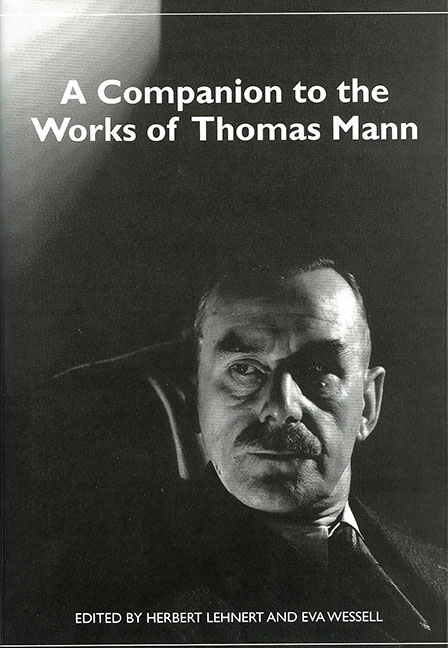Book contents
- Frontmatter
- Contents
- Foreword
- Thomas Mann's Works
- List of Abbreviations
- Introduction
- Thomas Mann's Beginnings and Buddenbrooks
- Art and Society in Thomas Mann's Early Novellas
- Love in Society: Thomas Mann's Early Stories
- “Death in Venice”
- “Mein ‘Friedrich’ — das ist was Anderes”: Thomas Mann's Unwritten Novel about Frederick the Great, King of Prussia
- Magic and Reflections: Thomas Mann's The Magic Mountain and His War Essays
- Thomas Mann's “Autobiographical” Stories
- Joseph and His Brothers
- Lotte in Weimar
- Thomas Mann's Late Politics
- “German” Music and German Catastrophe: A Re-Reading of Doktor Faustus
- The Gaze of Love, Longing, and Desire in Thomas Mann's “The Transposed Heads” and “The Black Swan”
- Felix Krull
- Female Identities and Autobiographical Impulses in Thomas Mann's Work
- Betrayed or Not Betrayed: A Testament?
- Thomas Mann's Comedies
- Notes on the Contributors
- Select Bibliography
- Index
Thomas Mann's Comedies
Published online by Cambridge University Press: 28 April 2017
- Frontmatter
- Contents
- Foreword
- Thomas Mann's Works
- List of Abbreviations
- Introduction
- Thomas Mann's Beginnings and Buddenbrooks
- Art and Society in Thomas Mann's Early Novellas
- Love in Society: Thomas Mann's Early Stories
- “Death in Venice”
- “Mein ‘Friedrich’ — das ist was Anderes”: Thomas Mann's Unwritten Novel about Frederick the Great, King of Prussia
- Magic and Reflections: Thomas Mann's The Magic Mountain and His War Essays
- Thomas Mann's “Autobiographical” Stories
- Joseph and His Brothers
- Lotte in Weimar
- Thomas Mann's Late Politics
- “German” Music and German Catastrophe: A Re-Reading of Doktor Faustus
- The Gaze of Love, Longing, and Desire in Thomas Mann's “The Transposed Heads” and “The Black Swan”
- Felix Krull
- Female Identities and Autobiographical Impulses in Thomas Mann's Work
- Betrayed or Not Betrayed: A Testament?
- Thomas Mann's Comedies
- Notes on the Contributors
- Select Bibliography
- Index
Summary
Acomedy traditionally is considered a humorous play in which a man and a woman look forward to a happy future together after having triumphed over adversities. Thomas Mann once called his second novel, Königliche Hoheit (Royal Highness, 1909) a “Lustspiel” (comedy), reacting to critics who had judged it to be a descent into banality. In a letter to the wife of his publisher he promised that never again would he write a comedy in which the lovers “get each other at the end.”
Critics were accustomed to the tragic mode in Mann's work. In Buddenbrooks (1901) a family lives for a business at the expense of love, but that sacrifice cannot arrest the decline of the firm. The end of the novel shows an assembly of frustrated women. In Königliche Hoheit love triumphs and the novel ends with a marriage. Mann was justified in calling the work a comedy, though it is, of course, not a play. Neither does it descend into banality. But more works in the tragic mode were coming, and they were considered the more relevant ones: in “Der Tod in Venedig” (Death in Venice, 1912) a great writer succumbs to passion and death; Der Zauberberg (The Magic Mountain, 1924) makes its reader doubt whether its protagonist Hans Castorp will survive the First World War, and Doktor Faustus (1947) ends with the insanity and death of a great German genius, while the narrator mourns a devastated Germany.
There is much humor in Mann's texts, including the two texts to be considered here as quasi-comedies: Königliche Hoheit and Der Erwählte (The Chosen One, published in English as The Holy Sinner, 1951). In both texts a protagonist who is alienated from the world, an outsider, and thus in a situation tending more toward the tragic than the comic, meets a happy or conciliatory end. The way the outsider is reconciled to his destiny in a comedic mode is to be understood in the light of Nietzsche's aphorism 270 from Jenseits von Gut und Böse (Beyond Good and Evil, 1886). In it Nietzsche claims a distinctive (“vornehm”) status for humans who have suffered deeply. The ranking order among humans, Nietzsche maintains (and Mann liked to quote this statement) is almost determined by the ability to suffer. A person with such an outsider status, Nietzsche continues, needs masks.
- Type
- Chapter
- Information
- A Companion to the Works of Thomas Mann , pp. 307 - 322Publisher: Boydell & BrewerPrint publication year: 2004

